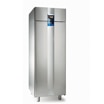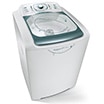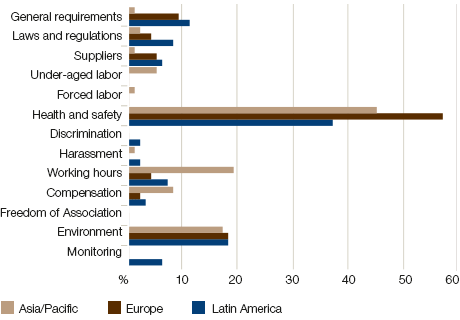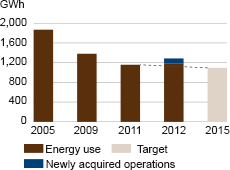Continuing to be a sustainability leader and implementing the sustainability strategy across the Group are central to delivering long-term value to customers, employees, shareholders and the wider world.
This year, the Electrolux Group placed strong emphasis on its work to integrate sustainability priorities within all aspects of the business. Its sustainability strategy focuses both on responsibly managing social, ethical and environmental risks and on developing emerging opportunities around new products, materials, and markets. It comprises three core aspects:
- Products, services and markets—to sustainably provide resource-efficient products and services that are accessible to more people around the world.
- People and operations—to engage employees in continually improving operations for the safety of people and the good of the environment.
- Stakeholders and society—to build trust and connect with stakeholders across the value chain to achieve successful sustainability outcomes.
The strategy is supported by targets to make operations and products more eco-efficient, and promote high ethical standards and transparency across the business.
In addition, Electrolux introduced a group-wide program, The Purpose, to highlight initiatives that make a positive everyday difference in people’s lives and for the planet. The Purpose is intended to support the sustainability strategy, driving everyone in the company to develop smart, resource-efficient solutions, contribute to solving global challenges, improve people’s lives, and grow with the highest ethical standards and least environmental impact. See more at Snapshot: On Purpose.
Setting priorities
The sustainability strategy is underpinned by clear sustainability priorities. These are determined by the business strategy. They also take into account market and consumer megatrends and issues of importance to stakeholders who are most affected by the business and most critical to its success.
On an annual basis, Electrolux uses a materiality process to identify these priorities and realign the strategy and reporting with emerging stakeholder expectations. The company monitors issues across the product lifecycle, engages in dialog, conducts surveys, consults market intelligence reviews and media to identify key issues and stay ahead of trends. Electrolux also applies global standards, from ISO and the Global Reporting Initiative (GRI) to the UN Guiding Principles on Business and Human Rights.
Products, services and markets
Core issues:
- Adapting products to the growing middle class in emerging markets
- Developing energy and water-efficient products
- Promoting sales of green products
- Eliminating potentially hazardous materials in products
- Phasing out greenhouse gases
Electrolux uses lifecycle analysis to assess the environmental impact of its products and services. This shows that up to 80% of the total environmental impact of appliances occurs during use. Improving efficiency of the product fleet and making efficient appliances available in all markets are therefore the Group’s most important priorities.
Reducing environmental impact
Sustainable innovation is among the top four priorities of the Electrolux R&D program. As part of 2015 Group goals, investment in developing technology will increase by 20%, with a focus on energy and water efficiency and design-for-recycling. From 2012, at least one third of the Group’s product development spend will be sustainability-related, the majority invested in energy efficiency.
During 2012, product targets for chemical use and energy and water reductions were set for key product lines in all major markets. Greenhouse gases will be substituted for alternatives with low global warming potential across the company. This process was completed for refrigerators this year in Australia, ahead of 2016 legislation to phase out these gases.
Product innovation
The Vario heatpump dryer, with its energy-efficiency rating of A+++, is the best in the European market. In Brazil, a key feature of the Ecologic washing machine is superefficient water use. Professional’s Ecostore, which consumes 65% less energy than equivalent refrigerators, won Italy’s ‘Horeca 24 Innovation of the Year’ for green solutions in the hotel and restaurant industry.
As of 2012, more stringent European Eco-Design energy-efficiency requirements mean refrigerators in energy class ‘A’ can no longer be placed on the market. Class ‘A’ dishwashers and washing machines will no longer be sold as of December 1, 2013. Electrolux supports developments to phase out inefficient appliances, along with better enforcement of efficiency standards.
During 2013 the company will continue to refine its product performance monitoring methodology to keep track of product targets, and update its Restricted Materials List (RML).

Ecostore Refrigerators
Electrolux Professional Ecostore refrigerators are energy-efficient and robust and provide 50 liters more space than equivalent cabinets. It consumes 65% less energy than equivalent refrigerators, and won Italy’s ‘Horeca 24 Innovation of the Year’ for green solutions in the hotel and restaurant industry.

Ecologic
This washing machine has a capacity of 12 kg and is the most water-efficient and economic top-load washing machine in the market.
Global Green Range
The Electrolux Green Range comprises consumer products with the best environmental performance, which in 2012 accounted for 10% of total units sold and 18% of gross profit. Criteria for inclusion in the range are reviewed regularly. To build consumer awareness of the value of efficient appliances, Electrolux will increase the focus on efficiency and other environmental benefits in marketing messages globally, tailored to what is relevant for products and in local markets.
Growing the market for the most efficient products remains a challenge. Electrolux is working with governments, retailers and others around the world to raise consumer awareness of the benefits of efficient appliances.
Consumer products with the best environmental performance accounted for 10% of total units sold and 18% of gross profit.
People and operations
Core issues:
- Reducing energy, water, waste and emissions
- Ethical business practices
- Aligning new operations with Group standards
- Health and safety
Electrolux is building a stronger brand, better reputation and more profitable business by reducing negative social and environmental impacts, lowering operating costs and minimizing business risk.
Shrinking the environmental footprint
The Group has a strong track record in energy reduction. The 2012 one-year 3.5% energy-reduction target has been integrated into a new 2015 target to reduce energy by 15% compared to 2011 production volumes. The Group realized a 6% relative improvement in 2012, indicating a significant rise in production efficiency. In absolute terms, the result was a marginal increase, due to a rise in production volumes.
Work towards increasing the quality of logistics data for shipments has continued. This information provides better insight into current performance against the Group’s 15% carbon-reduction target for transport emissions by 2014.
Water efficiency improved and the company is on track to exceed its 2014 20% water-reduction target. With regard to Electrolux Green Spirit program for greater efficiency in factories, by the end of 2012, almost 50% had achieved gold standard, with one unit – in Hungary – securing platinum. The program will continue in 2013.
Monitoring
Robust monitoring procedures help ensure that the Group lives up to its principles relating to labor, environment and health and safety. During 2012, 18 Code of Conduct audits were conducted in nine countries by Electrolux and third-party auditing teams. In 2013, Electrolux will introduce a global provider for ISO and OSHAS certification. In addition to certification, performance against environmental and health and safety provisions set out in the Electrolux Workplace Standard will also be monitored. The new approach will deliver improved governance and reporting, as well as greater harmonization across the Group.
In 2012, 85% of the Group’s white collar workers took part in the Employee Engagement Survey. Approximately 80% stated that company actions reflected its Foundation of ethics and integrity, respect and diversity and safety and sustainability. Fair and equal treatment is an area employees regarded as needing improvement. Electrolux introduced the Purpose to engage employees in sustainability objectives. The program aims to build an understanding of the value Electrolux creates beyond financial and market objectives.
Health and safety
With a Group incident rate (TCIR) of 1.1, almost 70% of factories have achieved below 1.0, considered good performance. The company aims to reduce this by a further 5% in 2013. A ‘100 days without accident’ program was launched to spur positive, safety-focused series of events across the company. To build an even stronger safety culture across the organization, a global safety management system will be rolled out from 2013.
Ethics, integrity and human rights
Continued focus will be on bringing Egyptian Olympic and Chilean CTI operations, acquired in 2011, in line with high Group standards.
In 2012, Electrolux stepped up its approach to human rights. It conducted a corporate human rights risk assessment and began alignment with the UN Guiding Principles on Business and Human Rights. In 2013, the Code of Conduct will be updated to reflect the findings. The Ethics Program, including training and a helpline operated by a third party, rolled out in seven European countries in 2012. This will continue in 2013. Approximately 75% of all employees have access to confidential reporting helplines located in Europe, North and Latin America. The bulk of the reported cases relate to workplace conduct.
Stakeholders and society
Core issues:
- Transparency, accountability and dialog
- Responsible sourcing
- Restructuring
- Public advocacy
Responsible sourcing
Electrolux is committed to high standards wherever it operates. As the Group expands into new regions and markets, different challenges and risk factors arise in the supply chain. Due in part to their growing importance as markets, the proportion of manufacturing from low-cost countries currently accounts for 60% of global production, up from 30% in 2004.
The Responsible Sourcing program helps ensure that suppliers adhere to the same high environmental and labor standards. Compliance to the Electrolux Workplace Standard is mandatory and non-negotiable criteria and is used in evaluating both existing and potential suppliers. Through audits, training and reporting, the program aims to improve labor and environmental conditions by building transparent and supportive relationships with suppliers.
In 2012, 293 (360) audits were conducted with a focus on markets defined as high or medium risk. Most findings related to health and safety issues and Electrolux is working to address these with suppliers. A Supplier Summit was held in Thailand for some 60 suppliers to raise awareness and share best practice. During the year, an energy reporting standard was also piloted among suppliers.
Responsible sourcing – Audit findings
Health and safety continue to be the area with most non-compliances, followed by environment. Issues related to under-aged labor are primarily found in Asia Pacific, but cases are rare. The majority of these incidents relate to insufficient protection of authorized minors (16-18 years). Five (8) cases of under-aged workers were found in 2012.
Restructuring
Electrolux continues to relocate its operations to align with business strategies. At the same time, the company is mindful that these decisions affect individuals and local communities. While relocation benefits new regions with jobs, knowledge transfer and economic opportunity, closing operations is a difficult process for all involved.
During 2012, Electrolux reduced its white and blue collar staff by approximately 500, primarily in Europe. In setting up new operations or managing organizational change, Electrolux aims to act transparently and responsibly, in dialog with those affected. A restructuring program was initiated in 2012 that impacts European operations, including Major Appliances and Group staff functions. An important element of the program was to facilitate a smooth and cost-effective transition, especially in regard to moving the organization from Brussels in Belgium to Stockholm. Since then, approximately 20% of employees affected by the program have found alternative employment within Electrolux.
In factories in Schwanden in Switzerland and Mariestad in Sweden – where downsizing is scheduled – agreements for a social plan were signed to mitigate negative consequences for employees. In Revin in France, where washing machines are produced, Electrolux is in dialog with unions, local authorities and the French government to find solutions for affected employees.
Transparency, partnerships and dialogue
Building trust with stakeholders and demonstrating that the company is a responsible societal partner is important to Electrolux. The Group strives for high levels of transparency regarding its actions and impacts, and openness in its dealings with stakeholders. It aims to engage actively in the debate on issues affecting its industry and works with others to address these along the value chain.
This year, socially responsible investors underlined greater expectations on Electrolux to focus on human rights. In May, Electrolux hosted a Human Rights seminar involving Middlesex University (Great Britain), the Swedish Foreign Ministry, and other companies, on how to implement the UN Guiding Principles on Human Rights (UNGP). Learnings will be shared and applied across the company. Dialog will continue through involvement with UNICEF’s network on Children’s Rights and Business Principles, and the Swedish Network for Business and Human Rights.




